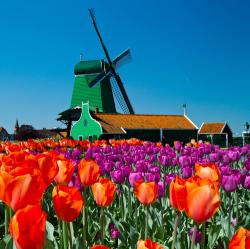find your perfect postgrad program
Search our Database of 30,000 Courses
Postgraduate Study in the Netherlands
Find courses in the NETHERLANDSThe Netherlands – or Holland as it is often referred to – is a great country to continue your education at university level, with over 200 undergraduate degrees taught in the English language in Holland, as well as plenty of postgraduate programs. In fact there are over 1,500 English-taught courses on offer in Holland.
The population of the Netherlands is around 16.5 million, and the national language is Dutch, but English is very much a prominent second language with over 70% of the population demonstrating a decent level of fluency. This is another reason why it is a great place to study a degree program taught in the English language.
Holland is a diverse and interesting country, known for its beautiful, flat countryside filled with windmills and tulips, as well as vibrant, cultural and progressive cities such as Amsterdam and Rotterdam. The country has an awful lot to offer in its own right, and with its position in Europe, with the North Sea to the North/West, Germany to the East and Belgium to the South, if you are studying and living in Holland you are ideally placed to explore the rest of Europe.
Holland: Dutch universities and education
There are plenty of institutions of higher education in the Netherlands, these can be split up into two main types – Research Universities and Universities of Applied Sciences. Generally speaking, Research Universities offer academic programmes in particular subjects, whereas Universities of Applied Sciences offer vocational courses, ie degree programs that lead the student into a specific profession/career. Both of these types of university can award bachelors and masters degrees. PhD degrees are only offered by research universities.
In the Netherlands there are also a few Institutes of International Education – which are a great option for international students, and these only offer masters courses. There are also a few other institutions in the Netherlands that offer higher education programs.
Postgraduate education in the Netherlands is internationally recognised as being of a very high quality – this is in part due to the national system of regulation and quality assurance. Holland’s Ministry of Education, Culture and Science (OCW) is responsible for all education legislation, while the responsibility for accreditation has been allocated to the Accreditation Organization of the Netherlands and Flanders (NVAO).
Dutch law requires all degree programs be evaluated against a specific set of criteria, and masters programs that meet these criteria are accredited by the NVAO. PhD programs are the responsibility of individual universities and cannot be accredited by the NVAO.
Holland: tuition fees and funding

There are tuition fees for undergraduate and postgraduate programs in the Netherlands, however these are pretty reasonable when compared to other countries. In 2012 the annual tuition fees for an undergraduate course at a Dutch university start at €1,771 for EU students. Tuition fees are higher for non-EU students averaging around €8,000.
Scholarships and bursaries
Many Dutch universities will offer scholarships and bursaries to support the students, so it is worth checking the funding pages of your chosen institution to see what is available. Your home country may also offer funding for you to study in Holland, so check with officials from your own country.
The Netherlands: living in Holland
The cost of living in Holland is comparable with the costs of living in the UK and other European countries, and as with other countries, the costs obviously depend in part on whereabouts in the country you choose to live and study. For example, living and studying at a university in Amsterdam will cost significantly more than if you opt for an institution in a more rural location or indeed a smaller city.
Research shows that postgraduate degree students in the Netherlands spend around €1,000 a month on living and studying (excluding tuition fees). Because of its flat landscape, Holland is totally geared up for cyclists, and investing in a cheap second-hand bike is an excellent way to reduce travel costs (bus/train tickets, petrol costs, etc).
Work
It is also possible for overseas students to work in the Netherlands while they are studying, although the number of hours that they are allowed to work may be restricted depending on what country they originate from.
Healthcare and insurance
Everyone in Holland needs to have health insurance. You may be covered by a policy you already have from your home country – so check with your current healthcare provider. Otherwise you can take out a Dutch Public Healthcare Insurance, or an appropriate private policy from a Dutch company.
Holland: visas and immigration
To study in Holland as a postgraduate student there is a selection of visas and permits that you may need to apply for:
1. Study Entry Visa
2. Residence Permit
3. Work Permit
The necessity of this documentation will obviously depend on your nationality, for example EU students and Swiss nationals can live and study in Holland without visas or permits – as they can in any European country – as long as they have a valid passport.
Registering as a new resident

If you are staying in Holland for more than four months, which as a postgraduate student you will be, you need to go to the city council of the Dutch area where you are living and register as a new resident. Everybody that plans to stay in the Netherlands for longer than four months, irrespective of their nationality or reason for being in the country needs to register as a new resident. Your university will want to see proof that you have registered at the city council when you register for your course.
To register as a new resident you will need:
1. A valid passport
2. Evidence of a place to live, ie tenancy contract or halls of residence contract
3. Birth certificate
Registering with the Dutch Immigration Authorities
If you are staying for more than four months – which as a masters degree student you almost certainly will be – you may also want to register with the Dutch Immigration Authorities (IND). If you are an EU student you are under no obligation to do this, however it is free of charge and could come in handy at some point during your stay, for example if you decide you want to apply for a mortgage.
To register with the IND you will need:
1. A valid passport
2. Proof of reason for stay (ie university documentation)
3. Proof of ability to support yourself financially
4. Health insurance
Short stay visa
If you are an International Student – ie not from Europe – you will need a short stay (Schengen) visa if you are planning to be in Holland for less than 90 days. As a master's degree or PhD student, the chances are you will need to be in Holland for longer than three months, however if you are opting for a Schengen visa bear in mind that you can get single entry short stay visas and multiple entry short stay visas – so make sure you apply for the right one or you could end up having to make another appointment at the IND to change it.
Long stay visa
If you are planning on studying and living in the Netherlands for more than 90 days and you are not from the EU, you will almost certainly need to get a long stay visa. This type of visa is called a provisional residence permit, and the Dutch term is Machtiging tot Voorlopig Verblijf (MVV).
An MVV will allow you to legally enter the Netherlands, however once you have arrived you will have to apply for an actual residence permit. Your MVV will be valid for six months, during which time you and your institution can apply for your residence permit.
To apply for an MVV you will need:
1. A valid passport
2. Proof of sufficient financial means
3. Proof of place at a Dutch university
4. You may need proof of a sufficient proficiency in the English language depending on your nationality
Residence Permit
If you’re a non EU student, nor a Swiss national, and you are planning on staying in the Netherlands for more than three months, you will probably be required to apply for a Residence Permit. These are generally issued for a one-year period, but can be longer or shorter depending on your needs. If for some reason your course changes and you need to stay for longer than originally expected, you must apply for an extension before the permit expires. The university that you are planning to do your studies at should apply for your residence permit for you – but you will have to make sure you have the appropriate visa, ie a Long Stay Visa (MVV).
International students in the Netherlands
 Holland is a popular destination for international students, this is for many reasons, including the relaxed, open-minded way of life, great cultural cities, beautiful countryside, not to mention the high quality of the education system.
Holland is a popular destination for international students, this is for many reasons, including the relaxed, open-minded way of life, great cultural cities, beautiful countryside, not to mention the high quality of the education system.
The number of international students in the Netherlands in 2011 was 81,700 – these are broken down into:
37,550 EU + EFTA [1] diploma mobile students;
19,050 non-EU+EFTA diploma mobile students [2];
7,600 students within Erasmus or with residence permits for internship;
17,500 other inbound diploma and credit mobile students.*[2]
* These are approximate figures and have been obtained from the Nuffic website ( www.nuffic.nl ).
[1] EFTA: Iceland, Norway, Liechtenstein and Switzerland.
[2] Diploma mobility: to complete a study program abroad; credit mobility: to gain credits abroad towards the program at home.
Countries of origin of international students in Holland:
1. Germany: 24,750*
2. China: 5,450
3. Belgium: 2,650*
4. Spain: 2,050*
5. France: 2,000*
* at least this many students from this country
Popular degree programs among international students:
At Research Universities
1. Economics
2. Behaviour & Society
3. Engineering
4. Language & Culture
At Universities of Applied Sciences
1. Economics
2. Language & Culture
3. Behaviour & Society
4. Engineering
Destination countries of Dutch students abroad:
Obviously the Dutch students also sometimes like to travel overseas to continue their education! Here is a list of their preferred destinations in 2011.
United Kingdom: 5,800*
Belgium: 4,450**
Germany: 2,100**
United States: 1,700**
Spain: 1,350**
* rough estimate
** at least
PLEASE NOTE ALL FIGURES ON THIS PAGE HAVE BEEN OBTAINED FROM THE NUFFIC WEBSITE – NUFFIC IS THE NETHERLANDS ORGANISATION FOR INTERNATIONAL COOPERATION IN HIGHER EDUCATION.
Language requirements for international students
If you are an international student and you want to study a degree program taught in the English language in Holland, you must be able to speak, read and write English to a satisfactory level. Foreign students must pass an English language test prior to their admittance into a degree program – IELTS and TOEFL are commonly accepted, but institutions may accept other tests. The required scores are at least 550 (paper based) or 213 (computer based) for TOEFL. For IELTS a score of at least 6 is required. Check with your preferred institution to see what scores are necessary and if the institution offers international students any help with the English language.
PLEASE NOTE: As a result of Brexit, from Autumn 2021 postgraduate students from the European Union studying at a UK university will be charged the same tuition fees as international students. Meanwhile, UK students studying their postgraduate course at a European university are also likely to incur higher tuition fees than their EU counterparts. It is advisable to check with the individual universities in the UK and Europe for up-to-date information on tuition fees for all postgraduate programs.
Find your PERFECT POSTGRAD PROGRAM
